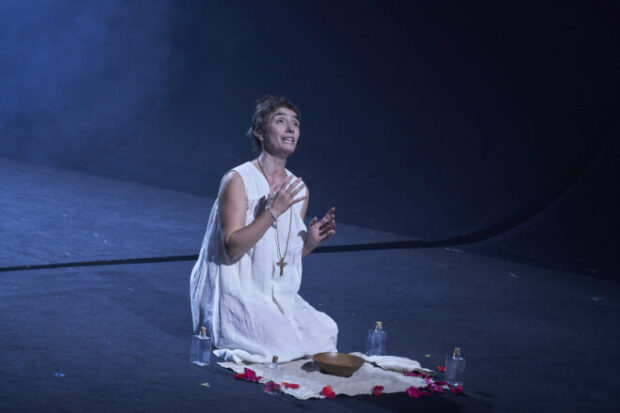 Spain Puccini, Il trittico: Soloists, Chorus and Orchestra of the Gran Theatre del Liceu / Susanna Mälkki (conductor). Gran Theatre del Liceu, Barcelona, 1.12.2022. (JMI)
Spain Puccini, Il trittico: Soloists, Chorus and Orchestra of the Gran Theatre del Liceu / Susanna Mälkki (conductor). Gran Theatre del Liceu, Barcelona, 1.12.2022. (JMI)

Production:
Director – Lotte de Beer
Sets – Bernhard Hammer
Costumes – Jorine van Beek
Lighting – Alex Brok
Casts:
Il tabarro
Giorgetta – Lise Davidsen
Luigi – Brandon Jovanovich
Michele – Ambrogio Maestri
Tinca – Pablo García-López
Talpa – Valeriano Lanchas
Frugola – Mireia Pintó
Suor Angelica
Suor Angelica – Ermonela Jaho
La Principessa – Daniela Barcellona
La Badessa – Maria Luisa Corbacho
Gianni Schicchi
Gianni Schicchi – Ambrogio Maestri
Lauretta – Ruth Iniesta
Rinuccio – Iván Ayón-Rivas
Simone – Stefano Palatchi
Zita – Daniela Barcellona
It has been 35 years since the Liceu staged all three operas from Giacomo Puccini’s Il trittico on the same day, although they have been done separately over the years. The performance I attended was a great success, based upon two fundamental elements: outstanding musical direction and an excellent vocal cast.
The production by Lotte De Beer originated at Munich’s Bayerische Staatsoper, where it premiered in December 2017. I had the chance to see it there twice and thought it was brilliant – and I found it to be so on this occasion as well.
There is basically one simple set for all three operas: a small space enclosed by curved walls, with the action taking place in the front. Some elements make it clear that Il tabarro takes place on a barge, and the opera begins with the burial of Giorgetta and Michele’s son. Suor Angelica also begins with the burial of the protagonist’s son, which intensifies the confrontation between Suor Angelica and La Principessa; this is brilliantly resolved at the end of the opera with the death of Angelica. Finally, props are added to bring Gianni Schicchi to life.
The costumes are attractive, especially in Gianni Schicchi which takes place in the Middle Ages, and the lighting is effective throughout.
The Finnish conductor Susanna Mälkki was making her Barcelona debut, for me, she was the big success of the night, with her careful and exceptionally delicate, nuanced conducting, especially in Il tabarro and Suor Angelica. She offered a good reading in Schicchi, but I didn’t find it to be at the level of the first two operas. In any case, it was a truly memorable debut, and I hope that we will be able to see her again soon in this pit. Under her baton, I found the Orchestra of the Gran Teatre del Liceu clearly improved, which is very good news.
Il tabarro
Giorgetta was sung by soprano Lise Davidsen, who has again shown that few voices today are as important as hers. Since her debut more than five years ago, she has attracted much attention and is one of the most sought-after sopranos, with good reason.
Brandon Jovanovich was Luigi, and his spinto tenor was well-suited to the character. His performance was not particularly brilliant, but it was above what I had expected.
Michele was sung by baritone Ambrogio Maestri, who would later double as Gianni Schicchi. He has a sonorous and ample voice, well-suited to the part.
Suor Angelica

Ermonela Jaho triumphed as Suor Angelica in an exciting performance. She is one of the best possible interpreters of the role today, if not the best of all. Emotion is always present with this stupendous artist, and she had a notable success with her ‘Senza mamma’.
La Principessa was mezzo-soprano Daniela Barcellona, whom we have seen so many times in Rossini’s operas, but voices change with time. Here she gave an intense interpretation of the character in her confrontation with Suor Angelica.
Gianni Schicchi

The protagonist who gives title to the opera was played by baritone Ambrogio Maestri, one of the few who sings both the serious and buffo roles. He shone here in a successful Schicchi.
The aria ‘O mio babbino caro’ sung by soprano Ruth Iniesta was good. She has an admirable voice, although it is not strong in volume.
The impression left by tenor Iván Ayón Rivas as Rinuccio was first-rate. He has an appealing, light-lyric voice and sang the aria dedicated to Firenze with gusto and expressiveness. It was a good debut in the house.
Jose M. Irurzun
